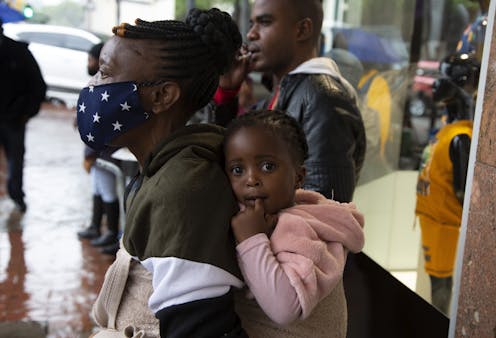It looks like Omicron causes milder illness – is this how COVID becomes endemic?
- Written by Hamish McCallum, Director, Centre for Planetary Health and Food Security, Griffith University

These are very early days in terms of our understanding the Omicron variant. What is known is that it has a large number of mutations, particularly in the spike protein and it appears to be rapidly spreading in specific parts of the world.
Very early indications[1] from Africa suggest it does not cause particularly severe disease (though the World Health Organization has urged caution[2] given the limited data available).
At this point, it isn’t clear whether it has any greater capacity to evade vaccines than other SARS-CoV-2 strains such as Delta.
It is very common for viruses to become less virulent (that is, cause less severe disease) once they become established in a population. The classic example is myxomatosis, which killed 99% of rabbits when first introduced into Australia, but which now causes much lower mortality[3].
Some experts have predicted[4] COVID will also become less severe as it transitions to an endemic level of disease – settling into a predictable pattern of infections in a given location. It’s possible the Omicron variant may be the first step in this process.
Read more: Is COVID-19 here to stay? A team of biologists explains what it means for a virus to become endemic[5]
Why some variants become dominant
Evolutionary biology suggests variants are more likely to thrive if they increase more rapidly in the human population than current strains. This means two things: strains with a higher R number[6] (the basic reproduction number, or the average number of people an infectious person will likely infect) will replace those with a lower R number.
Additionally, strains that lead to the host being infectious earlier will replace those that take longer to become infectious. So strains with a shorter incubation period replace those with a longer incubation period. This appears to be the case with Delta, which has a shorter incubation period than the strains before it[7].
Viral strain evolution needs to be considered in the particular population in which the variant appears. Disease evolution is expected to work differently in a population with low levels of vaccination[8] compared to one with higher levels of vaccination.
In a largely unvaccinated population, like South Africa where roughly 25% of the population is vaccinated[9] and the Omicron variant was first detected, strains with a high R number will stand a better chance of taking hold. But in a highly vaccinated population, strains that are better able to evade the vaccine will be more likely to dominate, even if they have a lower R number in unvaccinated people.
Less severe symptoms may fuel spread
So, would you expect a variant with less severe COVID symptoms to thrive? It really depends on the trade-offs between symptoms and transmissibility.
If symptoms are less severe, people are less likely to come forward to be tested and therefore are less likely to isolate. Some may not realise they have COVID at all. Therefore, a strain with low virulence (meaning[10] it has a lower ability to cause severe symptoms in the body) may be better able to transmit to more people than highly virulent strains.
On the other hand, as appeared to be the case for Delta, some variants can cause higher viraemia[12] than others – meaning higher levels of the virus within infected people’s bodies. The more virus present, the more likely the person is to be able to successfully transmit the disease. This is because of the dose-response relationship[13] – the higher the infective dose, the more likely it is an infection will result.
Again, all things being equal (without yet knowing the details of exactly how specific mutations behave), higher levels of viraemia are likely to lead to more severe symptoms.
It is not clearly understood yet why Omicron is apparently highly transmissible at least in the African context, so at this stage we don’t know whether it produces higher levels of viraemia than other strains. Viral transmission is a complex multistage process[14], so many things may be responsible for Omicron’s high transmission rate.
Read more: COVID will likely shift from pandemic to endemic — but what does that mean?[15]
Watch and wait
What happens next is yet to be determined. Experts will look for more information on the transmissibility of Omicron, the level of viraemia it generates and the extent to which it is capable of evading either the existing vaccines or immune responses resulting from previous infection.
Omicron may well behave quite differently in a highly vaccinated population – such as we now have in Australia – compared with a population with very low levels of vaccination as is the case in most of sub-Saharan Africa. Nevertheless, the emergence of this new variant emphasises an effective vaccination effort worldwide[16] is necessary to overcome the COVID pandemic.
References
- ^ early indications (www.reuters.com)
- ^ urged caution (www.afr.com)
- ^ much lower mortality (www.sciencedirect.com)
- ^ have predicted (theconversation.com)
- ^ Is COVID-19 here to stay? A team of biologists explains what it means for a virus to become endemic (theconversation.com)
- ^ R number (www.newscientist.com)
- ^ shorter incubation period than the strains before it (www.thelancet.com)
- ^ low levels of vaccination (www.nbcnews.com)
- ^ roughly 25% of the population is vaccinated (ourworldindata.org)
- ^ meaning (www.biologyonline.com)
- ^ AP Photo/Denis Farrell (photos-cdn.aap.com.au)
- ^ viraemia (www.healthline.com)
- ^ dose-response relationship (www.britannica.com)
- ^ Viral transmission is a complex multistage process (royalsocietypublishing.org)
- ^ COVID will likely shift from pandemic to endemic — but what does that mean? (theconversation.com)
- ^ an effective vaccination effort worldwide (www.unhcr.org)

















